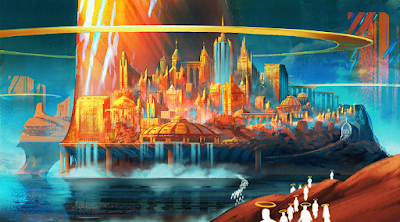Stephen Roney's Blog, page 5
August 20, 2025
Why Rylie Is Unattractive
There is a lot of chatter online about Rylie, a girl whom no men were interested in on a reality-TV Mormon dating show. Women are all shocked and offended that no man was interested in her. Men are all in agreement that she was showing all sorts of red flags.
The clip is apparently from at least five years ago. That the discussion comes up now is a sign of current female alarm at men checking out of the courtship and dating scene: MGTOW.
The fact that female commentators cannot see why Rylie is unattractive shows how alienated the sexes are.
It is not that Rylie is physically unattractive. The sexes are separated by a curtain on the show—they are choosing based on her short self-introduction, not on looks.
The first red flag is that Ryan volunteers to go first. She wants to take the lead. That is unfeminine. She will expect a husband to take the back sea.
The second red flag is that she talks only about herself and her interests. She sounds self-centred and unempathic.
The third red flag is that her future plans seem to rule out settling down. She is interested in adventure and looking forward to a trip to Australia. The point of courtship is to start a family, not a fling. Especially for a religious guy.
The fourth red flag is that she has expensive hobbies: travel across the globe, scuba diving, sky diving, hosting parties. Is she expecting her husband or boyfriend to fund this?
The fifth red flag is that she likes to party—a party girl. She likes to meet new people. A man marries to have a home and a woman who is always there.
The sixth red flag is that she makes demands right up front: “someone I can trust in and is going to be there for me”; without saying anything about what she offers in return. It is all take and no give.
The seventh red flag is that she speaks with the feminist lilt: a rising intonation at the end of many sentences. This is a signal that one is not finished speaking: women who use it use it to dominate the conversation and not allow others to speak.
Remarkably, the women commentators see nothing wrong with her pitch or her attitude, and blame the men for not wanting to put their necks in her noose.
And none of them note that one of the men on the reality show was also rejected by all the women. None of them feel sorry for him, or feel he was treated badly. Showing an utter lack of empathy for men.
It all shows why so many men in the developed world are giving up on women. And why nobody is having children any more.
'Od's Blog: Catholic comments on the passing parade.
August 19, 2025
Why Fantastic Four Is Flopping
 Pable Pascal as Mr. Fantastic
Pable Pascal as Mr. FantasticThe new Fantastic Four movie is dying at the box office. It is a bit of a mystery.
Some say it is because of “superhero fatigue.” People have had enough of superhero movies; the excitement has worn off.
But this does not tally: the first weekend, the Fantastic Four receipts were good. People wanted to see a superhero movie. There must have been some problem with this particular superhero movie, which turned those initial audiences off.
According to most critics, the movie was a decent production: good acting, good plot. If we can trust them, the problem was not quality.
That leaves wokeness. Although the movie was not aggressively woke, Pablo Pascal did not look like the Reed Richards of the comic book. He was presumably cast because he was Latino: current Oscar rules require DEI casting to qualify for an award. And they sex-changed the Silver Surfer.
I think the cultural climate has changed fast enough that the audiences are no longer willing to sit down for this nonsense even on a moderate level.
Why would they? The appeal of watching a live-action superhero movie is in seeing the familiar comic book characters come to life. You want them to be as close as possible to those you cherish in your memory. This was a big problem with the earlier Fantastic Four films—they could not get The Thing looking right. This one succeeds, then throws it all away by getting Reed Richards and the Silver Surfer wrong.
The same thing, of course, applies to race-swapping and sex-swapping in live-action remakes of the classic fairy tales. The principle is so simple, and so simple to understand, and yet they keep deliberately getting it wrong. This shows contempt for the original creation, like painting a moustache on the Mona Lisa. By extension, it shows contempt for the audience, the fan base.
What did they think would happen?
'Od's Blog: Catholic comments on the passing parade.
Sane Canada
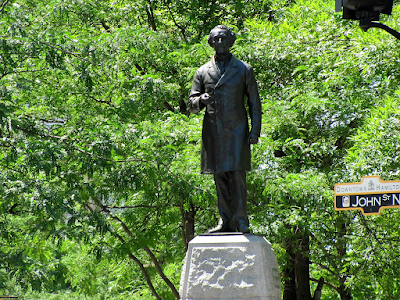
I first understood Canada had gone completely off the rails when Henry Morgentaler, the abortion doctor, was awarded the Order of Canada in 2008. And this was actually under a Conservative government. This was a declaration of war against morality, religion, and human rights.
I will not believe that Canada has returned to sanity and freedom until I see:
That Morgentaler Order of Canada posthumously revoked.All the statues of Sir John A Macdonald restored.Bill C-11, Bill C-18, and Bill C-63 or its successors, which censor free speech, repealed.Government funding pulled from the “legacy” media, restoring a free press.Tamara Lich and Chris Barbour cleared of all charges; with some form of reparations. Perhaps an Order of Canada for each.The Emergencies Act amended in such a way as to prevent a repeat of the Trudeau government’s actions in suppressing lawful and peaceful protest from ever happening again. One thought is that if invoking the act, a government must also fall, an election called in three months, with any members of the current cabinet not eligible for re-election.Currently, we are still rushing in the wrong direction. But this poisonous red tide can turn--as it turned in China after the devastation of the Cultural Revolution. As it seems to be decisively turning now in the US.
'Od's Blog: Catholic comments on the passing parade.
August 18, 2025
Mad Canada

I don’t know if you’ve noticed it yet, but most Canadians are mad.
You might object. Who am I to make such a judgement? Isn’t it more likely, if everyone else thinks differently, that I am the insane one? Orwell said, “Madness is a minority of one.”
And this is indeed how modern psychiatry tends to frame it.
An example of the current madness: this is the ad populum fallacy. Reality is not determined by popular vote. We cannot vote to make the earth flat.
I believe I have some perspective on this, from studying philosophy, comparative religions, and history, and from living abroad in diverse cultures: China, Korea, the Philippines, Saudi Arabia, Qatar, Dubai, not to mention across Canada and in the US. I also married into a Pakistani family.
Surely this allows me to see beyond the common consensus, and judge it.
Canadians are mostly mad.
To be fair, not just Canadians. Koreans are also mad. Americans are mad. Brits are mad. Japanese are mad. Filipinos are sane. Arabs are mostly sane, if you step away from mentioning Jews or Israel.
What makes the difference? Wealth seems to be part of it: rich people go crazy. And we have always known this: large manor homes are always haunted. There are skeleton closets.
But that, I think, is not the key. Wealth drives you crazy because, as the Gospel warns, wealth drives you away from God. It turns your focus towards the world.
And belief in God, the necessary first premise, is required for sanity.
In Filipino or in Arab culture, the existence of God is taken as a given.
In Canada, Korea, America, Britain, Japan, even when nominally acknowledged, God is mostly ignored. He seems at most an abstract concept.
You will object that in America there is a distinct and lively evangelical element. There is indeed; that is why there is hope for America. But even in America, this is a counterculture. In the Philippines or Saudi Arabia, monotheism is the mainstream.
In the New Testament, Jesus and the apostles spend most of their time casting out demons. This is their initial mission. In the early church, exorcist was a common ecclesial rank. It was assumed that any pagan converts needed to be exorcised. The rapid spread of Christianity through the Roman Empire, the rest of Europe, and today across Africa, was due to its famed ability to cast out demons.
And the classical gods were demons, as the early Christians indeed identified them. Each was or represented an obsession that could possess the mind.
Broadly, what we now call mental illness.
Now that faith in Christianity is waning, the demons are returning.
God is not just the ground of being, but also the ground of reason; he is the necessary first premise from which anything else and everything else is deduced. This, I think, is evident in Descartes’ Meditations: our warrant that anything else is real is that God is real, and would not deceive us.
Pull that anchor, and we know nothing. We do not even know, contra Descartes, that we ourselves exist. Buddhism challenges this very premise.
This is why in Buddhist and Hindu Asia, without a strong tradition of ethical monotheism, everything is seen as illusion, a moving sea of dreams. Not just the physical universe, either; but chains of induction, systematic philosophy, do not form. Only gnomic aphorisms, bursts of insight.
And the rapid growth of insanity in the developed world is due to the collapse of faith in God. The demons are returning.
On a social level, to give an example of how we have come untethered—without the anchor of God, we no longer understand what human equality means. Many—it seems most—now think it means people are the same, or even that they all deserve the same life outcomes. There is, for example, the feminist doctrine that men and women are the same and should perform all the same roles in equal proportions.
We can see this is obviously wrong, in athletics. Yet many deny it even here.
Human equality really means equal moral worth; equal worth in the eyes of God. And therefore equal treatment by the law. This is founded on Descartes’s reasoning: God exists; God is perfect goodness; God is just. It follows that God values us equally, in principle, judging us only on our own volitions. For this reason, for God’s sake, we must treat our neighbour as our equal.
Pull God from that equation, and it does not work. If we are not seeing it from God’s view, we are seeing it only from our own. Human worth, good and evil, is then based on our neighbour’s usefulness to us, or to the society as a whole.
One can immediately see how this has led to some of the worst mass murders and social upheavals of the last century and more; the worst cases of social madness.
Without the anchor of God, we similarly no longer understand freedom. Freedom is now just freedom to be selfish: self-indulgence, being able to do what we want, when we want.
Yet this is obviously wrong. The alcoholic wants to have another drink. Yet being an alcoholic is the opposite of freedom: it is enslavement to a want.
So too with most other wants. There is a truth to the old joke, “everything I want to do is either immoral, illegal, or fattening.” Most wants are addictions that, indulged too often, soon enslave us and do us harm.
True freedom is freedom to do what God wants. It is freedom of conscience: the freedom to do what our conscience tells us we ought to do.
Because we no longer understand this, social policy has become warped. It has actually been suppressing freedom of conscience, for the sake of feeding addictions.
Without the anchor of God, we cannot even agree on what is real. “Once people stop believing in God, they will believe anything.” Science is breaking down, along with public morality and civil discourse.
America, at least, now looks as though it might be regaining lucidity. I credit this to that evangelical remnant in the culture.
'Od's Blog: Catholic comments on the passing parade.
August 17, 2025
The Myth of the Dying Indian
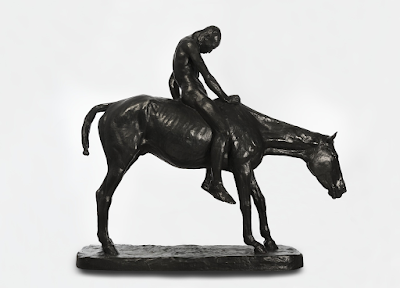
Hills and Angry Waters-- an old poem about Saint John, New Brunswick
Where bold the hills outjutting to the reef rough swept with spray,
And Whygoody's swirling water meets the tides of Fundy Bay,
An Indian Chieftain with his tribe had camped upon a day
By the coves and purling brooks of Managuashe.
Straight stood the chief outgazing o'er the billows flecked with foam,
Where the broken sunbeams wander and the shapeless shadows roam.
The south wind brought its message of the salmon speeding home,
To their river haunts beyond bold Managuashe.
Then blazed the bonfires brightly on the hills from bay to bay,
And the Indian braves and maidens danced and sang in wild array.
The Indian Chieftain and his tribe feasted 'till dawn of day,
On the old and loyal resorts of Managuashe.
Again gazed Panamseguis o'er the deep on rushing tide;
Now, his eyes were strained in wonder, low he bowed his head and sighed,
And to his people thus he spoke, humbled his voice and pride.
On the forest camping ground of Managuashe.
My brothers, braves and children of the noble Malicete,
Your hearts will burn with anger at the sight your eyes shall meet.
Behold! Upon you swelling flood the vanguard of a fleet
Which shall take from us our rugged Managuashe.
Many moons ago a vision by the great Manitou sent,
Appalled mine eyes and spirit, and I heard my tribe's lament.
I saw a wondrous great canoe with glistening wings intent,
On harbour making here at Managuashe.
Braves of some mighty nation strange, and of a feature white,
With thunderous magic weapons which blazed upon the night;
My people, like the falling leaves, sadly in hopeless plight,
Were scattered from the glens of Managuashe.
The vision changed and clearly I saw with wondering eyes,
Habitations, huge and strange, of a mighty race arise,
People of marvellous ways, and deft of hand, and wise,
Swarming great trails o'er Managuashe.
Then came to on the spirit of the "Hills and Angry Waves,"
His footfall like the trampling of swift and countless braves,
His voice like surging breakers in the deep and rocky caves.
Along the shore of lofty Managuashe.
His features stern, yet kindly, were wreathed in vapor cold,
His garment as pine needles, woven with ferns of gold,
He took my hand and sadly, and now our fate is told,
He led me from beloved Managuashe.
LH.W.
This poem is a nearly perfect expression of the myth of the Dying Indian. You’ve seen it many times in movies. Everyone thinks it is true. Indians are always dead or dying. It is like the similar myth of the Magic Negro.
The Indians are not dead and not gone. They are living in Saint John. I see them on the public transit and in the mall. And I, and many of the other riders or shoppers, probably have Indian blood, even if they do not know this, or look Indian or identify as Indian. There are many more Indians in Canada now than there were when the first modern Europeans were sighted.
They have not moved anywhere. The truth is more the reverse. Before the Europeans came, they were always moving. Now they generally stay in one place. Maliseet (Wolastoqay) Indians moved their village about every two years; the Cree every two weeks.
Their lands were never taken from them. Eighty percent of New Brunswick, and ninety percent of Canada, is still wild, unsettled, and available for hunting and foraging. The rest was sold by treaty. There are simply better ways for modern Indians to make a living, less vulnerable to famine and starvation in a bad season.
Their eyes did not burn with anger at the coming of the Europeans. The local Indians, here as in most other places, welcomed the Europeans and urged them to stay for the opportunity to trade, for access to their better technology and system of government, and for protection against their enemies. There were no “Indian wars” here—wars in which one side was Indian, and the other European. There were wars between European powers, and between Indian groups, and they might have intersected, but not Indian versus European wars. The political divide was not Indian versus European.
And there was no vanguard of a fleet here in Acadia or the Maritimes. Starting at or before Estevan Gomes in 1535, there were occasional visits by one or two ships at a time, fishermen or explorers, for a couple of centuries. Gradually there were trading posts, and a few French families came to farm the marshes. The French were not here for land; they were here for trade and to spread the gospel. Only at the end of the eighteenth century did you get the first fleet of Europeans seeking to settle—the Loyalist refugees (some of them Indians) driven out of the US.
Why are we determined to believe the Indians are gone?
Because Indians represent to us the innocence of our own childhood. We see a trace of this in the poem: as the Europeans appear, the Indians are dancing and singing—just having fun. And then the annoying adults show up, and tell them it is bedtime.
Since our childhood is irretrievably gone, we must also understand the happy carefree innocent Indians to be gone. Since we miss our childhood, we also lament the supposed disappearance of the Indians. It is ourselves we are feeling sorry for.
The pre-Columbian life of the native peoples was of course not at all the idyll we imagine.
And neither was our childhood.
We all need to grow up.
'Od's Blog: Catholic comments on the passing parade.
August 16, 2025
God in Everything
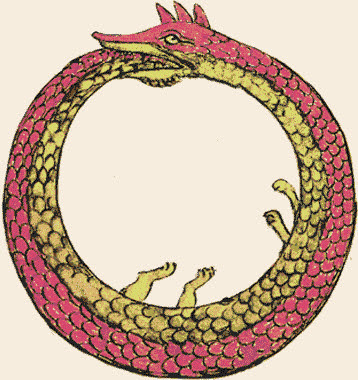 Ouroboros, the cosmic world-serpent
Ouroboros, the cosmic world-serpent
Friend Xerxes seeks to embrace all the joys of life. He sees God in everything. Even he says, the rattlesnake coiled to strike.
It sounds like a good, cheerful and magnanimous philosophy.
It is, however, not possible for a Christian to see God in everything. That is pantheism, or perhaps panentheism, not monotheism.
To worship everything would be a violation of the First (or Second, but who’s counting?) Commandment: “Thou shalt not make unto thee any graven image, or any likeness of any thing that is in heaven above, or that is in the earth beneath, or that is in the water under earth: Thou shalt not bow down thyself to them, nor serve them.” That is, you must not worship nature. God stands apart from anything in the physical universe, on land, or sea, or sky. “God is spirit, and his worshipers must worship in the Spirit and in truth.”
One thinks also of this passage from 1Kings:
“Then a great and powerful wind tore the mountains apart and shattered the rocks before the Lord, but the Lord was not in the wind. After the wind there was an earthquake, but the Lord was not in the earthquake. After the earthquake came a fire, but the Lord was not in the fire. And after the fire came a gentle whisper. When Elijah heard it, he pulled his cloak over his face and went out and stood at the mouth of the cave.”
There are evidently many things in nature God is not in. He is in the whispers, the inconspicuous or invisible, the mustard seed, the leaven. He is more present where the physical is more absent.
All of this is based on the Bible. Authoritative for Christians, but does pantheism perhaps make sense on its own merits?
It does not. As the later philosophers of India have pointed out, if you assert “God is in all things,” the concept God simply loses all meaning; as there is nothing other than God against which to define it. You have said nothing but “the universe is the universe.” “Things are things.”
Moreover, Xerxes choice of the rattlesnake image is telling, in a Freudian sense. The serpent is the standard Christian image of evil. If you hold that God is in all things, he must also be in evil: not just in natural evil, like rattlesnakes, cancer viruses, aging, death, and pain in childbirth, but also in moral evil, in murder and rape and incest. And he is in the ugly and defective, in offal and pollution and decay. This cannot be, for God is by definition perfect: perfect good, perfect truth, and perfect beauty.
You have simply turned away from God.
Nature has fallen. The prince of "this world" is, after all, the Devil.
On the other hand, one’s daily life can and should be understood as a conversation with God. If one is alert, and prayerful, little miracles are happening all the time, as well as little corrective messages.
'Od's Blog: Catholic comments on the passing parade.
August 15, 2025
The Princess and the Pea

Nobody gets the point of Hans Christian Andersen’s tale “The Princess and the Pea.” When I Grok for the moral of the story, its search of the consensus on the Internet brings up “don’t judge by appearances.”
That is, the princess does not look like a real princess, but she is.
This misses everything. In what sense is she a “real princess”?
Follow the text. The hero’s conflict is the inability to find a real princess. “He travelled all over the world to find one, but nowhere could he get what he wanted.”
Now, how hard is it to identify a real princess? A king will be the most prominent and well-known person in the country. His daughters will be princesses. Merriam-Webster: “princess: a female member of a royal family.”
Finding a real princess is about as hard as asking one question to anyone in the next country over. If somehow you don’t already know.
Andersen is plainly telling us that “princess” here is meant metaphorically.
“Suddenly a knocking was heard at the city gate, and the old king went to open it.”
Would a king go out personally to open the city gate? No king would, for reasons of national security and his own safety from assassins, even before any other considerations. Let alone an elderly king, on a stormy night.
Andersen is telling us that “king” here is also metaphorical.
“It was a princess standing out there in front of the gate. But, good gracious! what a sight the rain and the wind had made her look. The water ran down from her hair and clothes; it ran down into the toes of her shoes and out again at the heels. And yet she said that she was a real princess.”
Obviously, no princess in the dictionary meaning of the word would be out wandering in a foreign country alone with no place to go in a rainstorm.
Let alone “down at heel.” The rain is running into the toes of her shoes and out the heel. In other words, her shoes are worn out so that the heel is lower than the toe, and both have holes. She is literally not “well-heeled,” “down at the heel.” She is not someone accustomed to luxury.
So by what authority is she a princess? By her own. She says so.
Next, the elderly queen then puts a pea on her bed, and covers it with twenty mattresses and twenty coverlets. This odd old queen clearly has no maids nor ladies in waiting.
Were this not yet enough to make matters clear, how plausible is it for anyone, however sensitive and accustomed to luxury, to feel a pea under twenty mattresses?
“Princess” here means someone who demands to be treated like a princess; someone who will complain no matter what is done for her or given to her. A narcissist.
The next question is why on earth would any man want to marry such a woman? Yet the prince does exactly that, indeed searches far and wide for such a woman; with his mother assisting in the hunt.
And the clue is that his father is a “king,” and his mother a “queen.” They are both also narcissists. Andersen is showing to us why abused children come to be magnets for abusive partners. The “prince” has grown up with the experience of those he loves being constantly self-important and demanding. As the Catechism of the Catholic Church puts it, the family is the “school of love.” Seeking for love, the poor man will seek the same thing he knows in a mate. It will look like affection to him. He will feel unworthy of anything else.
And so he is trapped in a lifetime of abuse.
There, that is a true story.
'Od's Blog: Catholic comments on the passing parade.
August 14, 2025
The Really Stupid Party
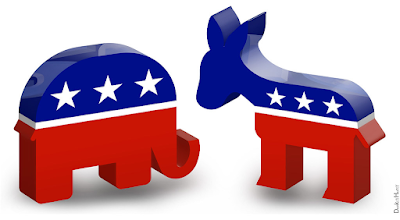
Much can be explained by a simple premise: the left is stupid, and the right is smart.
This is more or less understood, at least by the right, in such sayings as “If you are not a liberal at 25, you have no heart. If you are not a conservative at 35, you have no brain.”
Conservatives think the average leftist is naïve, not evil. Therefore, they tend to be more tolerant. The left thinks the right is not stupid, but evil. Therefore they will fight no holds barred.
One might object that the left is favoured by the expert class and by the professions. By the better educated. University faculties are all leftist. So surely this is the smarter side?
It does not follow. One cannot, after all, fail more than a relatively small number of students in any programme; especially when they are paying large amounts of money for the course. Necessarily, therefore, academics are geared towards those of average intelligence. Granted that a somewhat higher level of intelligence will allow one to get through with less effort; but there is a ceiling. Too smart, and the plodding pace of instruction will, literally, drive one to distraction. The too-intelligent will lose interest, lose concentration, fail or drop out.
Education at all levels is essentially obedience school. Can you follow directions and submit to authority?
This might sound like sour grapes; but it is not. It is the observation of someone holding multiple certificates and degrees.
A better clue to who it smarter is who favours meritocracy. Obviously, the smartest will prefer meritocracy, on average, because it is in their self-interest.
That would be the right. The left wants equity.
In a similar vein, quite visibly, really good-looking women tend to be conservative. Leftist women are rarely as attractive. It makes sense.
Successful politicians sometimes play dumb and folksy. Trump does; George W. Bush did. Reagan did. Ralph Klein did; Mike Harris did; Jean Chretien did. This is just good politics; it shows their intelligence. People often resent those more intelligent than they are.
But notice that these supposedly dumb politicians are the very ones who manage to achieve a great deal of their agenda. The proof is in the pudding: they are smart.
By comparison, Democratic leaders seem genuinely dumb: Kamala Harris, the senile Joe Biden, John Fetterman. How is it they cannot put forward more impressive intellects?
Because intelligent people rarely join their party.
Canada’s Liberals do not have the same problem—but this is because they are the “Natural Governing Party.” They will attract top talent for purely cynical reasons: because they are the likeliest path to power. This is due to tribal rather than ideological voting, notably in Quebec. In the US, similarly, voting used to be more tribal, not ideological. In those days one did encounter more capable Democratic candidates.
The best proof that the left is dumb is that their basic ideological premise is dumb. They believe that government is protection from greedy and bullying capitalists, corporations and religious groups. It does not occur to them that governments or government bureaucrats could also be greedy or power-hungry.
And not even just as likely. We have a natural protection against greedy or power-hungry corporations: we can choose not to buy. We have no such protection from government. We cannot choose not to pay our taxes, or obey the law.
An amusing recent example: the NDP’s recent campaign blaming inflation on corporate greed. Their proof that Loblaw’s was price-gouging was that you could buy the same items for less in Dollarama. So why couldn’t they simply shop at Dollarama?
Even if the NDP leadership was smart enough to realize this, they were counting on their constituency not to see it.
'Od's Blog: Catholic comments on the passing parade.
August 12, 2025
What Faith Really Means
Now faith is confidence in what we hope for and assurance about what we do not see. 2 This is what the ancients were commended for.
3 By faith we understand that the universe was formed at God’s command, so that what is seen was not made out of what was visible.
4 By faith Abel brought God a better offering than Cain did. By faith he was commended as righteous, when God spoke well of his offerings. And by faith Abel still speaks, even though he is dead.
5 By faith Enoch was taken from this life, so that he did not experience death: “He could not be found, because God had taken him away.”[a] For before he was taken, he was commended as one who pleased God. 6 And without faith it is impossible to please God, because anyone who comes to him must believe that he exists and that he rewards those who earnestly seek him.
7 By faith Noah, when warned about things not yet seen, in holy fear built an ark to save his family. By his faith he condemned the world and became heir of the righteousness that is in keeping with faith.
8 By faith Abraham, when called to go to a place he would later receive as his inheritance, obeyed and went, even though he did not know where he was going. 9 By faith he made his home in the promised land like a stranger in a foreign country; he lived in tents, as did Isaac and Jacob, who were heirs with him of the same promise. 10 For he was looking forward to the city with foundations, whose architect and builder is God. 11 And by faith even Sarah, who was past childbearing age, was enabled to bear children because she[b] considered him faithful who had made the promise. 12 And so from this one man, and he as good as dead, came descendants as numerous as the stars in the sky and as countless as the sand on the seashore.
13 All these people were still living by faith when they died. They did not receive the things promised; they only saw them and welcomed them from a distance, admitting that they were foreigners and strangers on earth. 14 People who say such things show that they are looking for a country of their own. 15 If they had been thinking of the country they had left, they would have had opportunity to return. 16 Instead, they were longing for a better country—a heavenly one. Therefore God is not ashamed to be called their God, for he has prepared a city for them.
Faith is a commonly misunderstood concept. It is often presented as mere belief in the existence of God; or as mere assent to the proposition that Jesus Christ is our Lord and Savior.
It has to do instead, as this passage seems to show us, with accepting the reality of the world we do not see—the spiritual world, the Kingdom of Heaven. This ties in with Jesus’s response to Thomas, who refused to believe in the resurrection until he saw and touched the wounds: “blessed are those who have not seen, and yet believe.”
Faith, according to the passage, is also “Confidence in what we hope for”; but we must distinguish it from the sister virtue of Hope: Faith, Hope, and Charity. The stress is on “confidence.” “Trust” seems like a rough cognate. Faith is prior, and the basis for hope.
It is not that we believe “without evidence.” It is a delusion to limit evidence to the physical senses. There are more things in heaven and earth, Horatio, than are dreamed of in that philosophy. There is conscience, there are self-evident truths, there is reasoning from first principles, there are intimations, there are dreams, there are private revelations, there are emotional truths. You cannot see love, but it is real.
“What is seen was not made out of what was visible.” That is, the eternal, spiritual world, the Kingdom of Heaven—is prior to the physical world. See Plato on this: his “ideal forms.” Also see the modern scientific theory of the “Big Bang.”
“By faith Abel still speaks, even though he is dead.” The physical world is mortal, and all things in it fade and die. The spiritual, on the other hand, is eternal. See Parmenides on this. Memories are evidence of this.
“By faith he [Abraham] made his home in the promised land like a stranger in a foreign country; he lived in tents, as did Isaac and Jacob, who were heirs with him of the same promise.”
In other words, the “promised land” is not any part of the physical world, not Canaan or Judea, but the kingdom of heaven. So long as we are in this physical world, we are exiles.
“All these people were still living by faith when they died. They did not receive the things promised.”
So did God fail to keep his promise? Were they foolish to keep faith? No—the point is that the promised world is not this physical world. “All these people were still living by faith when they died”—that is, they were still alive when they died, and continue to live, in the promise. Death exists only in the physical realm.
“They were longing for a better country.” This has been taken as the motto for the Order of Canada: “They sought a better country.” Supposedly meaning that recipients sought to make Canada a better country. But this interpretation is shown to be wrong by the very next phrase: “a heavenly one.” This falsification of the Biblical passage seems to make the point that earthly powers are in eternal opposition to heavenly ones.
“If they had been thinking of the country they had left, they would have had opportunity to return.”
This seems to open the door to the concept praying to saints. For “the country they had left,” in context, refers to the physical world, and “they” refers to a series of dead patriarchs. If they think of the physical world, they can return at any time.
Of course they can. Heaven is prior to earth. Heaven is perfect happiness, and any unresolved wish would prevent heaven from being heaven. Therefore, it must be possible to return, to intervene, or to communicate with the living.
But not reincarnation. Not ghosts.
Having achieved the Beatific Vision, one naturally would not want to turn one’s thoughts back to the soil. One might do so, like a Bodhisattva, in self-sacrifice, to help someone you love below.
'Od's Blog: Catholic comments on the passing parade.
August 11, 2025
Why the Canadian Government Seems to Hate Canada
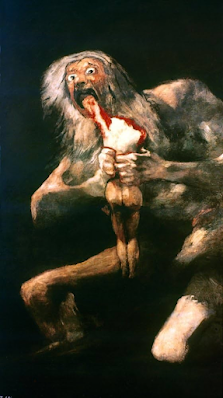
There is an old saying, “never attribute to malice what can be easily explained by simple incompetence.” And Justin Trudeau was certainly unqualified for his job as Canadian Prime Minister. Nevertheless, some pundit recently said that the destruction Justin Trudeau has wrought on Canada over the past ten years cannot be accounted for by mere incompetence. It must have been out of malice.
And Carney, boasted of being particularly well-qualified, seems to be continuing many of the same destructive policies. Notably the “elbows up” approach to negotiating with the US and Donald Trump: sheer suicide.
It sounds mad, of course: why would someone want to be Prime Minister in the first place, if they hate the country? Isn’t patriotism, love of country, the natural emotion?
Yet we can see it is true, not only of Trudeau, or Carnet, but of the left generally. Not only in Canada, but across the developed world. The Canadian “woke” left show open contempt of Canada: its history, its customs, its values. It is the despised patriarchy, a “settler colonial state,” guilty of imagined genocide against First Nations, and of an imagined history of slavery. Statues of its founders must be pulled down, their names erased from public places. Trudeau asserts, “there is no Canadian mainstream.” If not evil, Canada is nothing at all.
Trudeau’s policies are the natural expression of this. Canada must be beaten down and suppressed. And the fact is, this is a sentiment shared by enough Canadians to keep him in power for ten years, then vote in his chosen successor. With similar leaders and electoral successes in other nations.
Where does this weird hatred for established institutions come from? Commentators commonly cite guilt over the past; but I dissent. There is actually little in our collective past to feel guilty about; the guilt is mostly falsified and manufactured. It cannot be the cause.
It is often also described as “self-hate.” I almost used the term myself, and balked. That is not so. Nobody can plausibly accuse Justin Trudeau of having too little ego. It is not a matter of hating oneself, but of scapegoating others, either whitey or men or one’s own ancestors, in order to make oneself seem more important, significant, and virtuous.
I think narcissism is again, as so often, the answer. Across the developed world, thanks to modern pop psychology, “building self-esteem,” “self-assertion,” and the doctrine of “unconditional love” in childrearing, we have deliberately bred several generations of narcissists.
If you put a narcissist in charge of anything he has not built himself, he or she will try to destroy it. Why? Because he did not build it. Destroying it makes it fully his, uniquely his possession, and ensures no one else can own it.
This simple explanation can account for nearly everything that has gone wrong in the culture. It explains the seemingly self-destructive “woke” ad campaigns we have seen in recent years: executives and ad agencies seeming to deliberately alienate their consumers. Like Bud Light’s Dylan Mulvaney ads, or Jaguar’s bizarrely sexually ambiguous ads. It explains Hollywood movies going “woke” and alienating their audiences by deliberately tinkering with and altering the characters that built their “franchises.” It explains the many “legacy” comedy TV shows that seem to have stopped telling actual jokes and trying to be funny. It explains the outrageous media bias of recent years, grand old newspapers and news organizations destroying their credibility with the public. As David Burge put it, “The Left doesn’t create institutions. It infiltrates them, captures them, and then wears them like a skinsuit, demanding respect.”
If a narcissist has not created something--and narcissists are never creative--they will do their best to infiltrate, capture, destroy, and demand respect for themselves. Trudeau is a classic example.
Not incidentally, this is also true of the family. If a narcissist has children, he or she will do their best, openly or secretly, to destroy them. Abortion is the most obvious example. It expresses their complete possession and dominance. They will also tend to destroy the legacy of their parents, as Justin has marred the memory of his father Pierre. Like the mobs pulling down statues of the founders. Like Kronos in Greek myth, to the extent they can, they first castrate their own fathers, then devour each of their children as they are born.
Can Canada escape collapse? Perhaps. There are signs of redemption south of the border, at least. Canada always wants to do whatever big brother is doing, with a lag of about seven years.
But it will take several generations to repair the damage.
'Od's Blog: Catholic comments on the passing parade.

